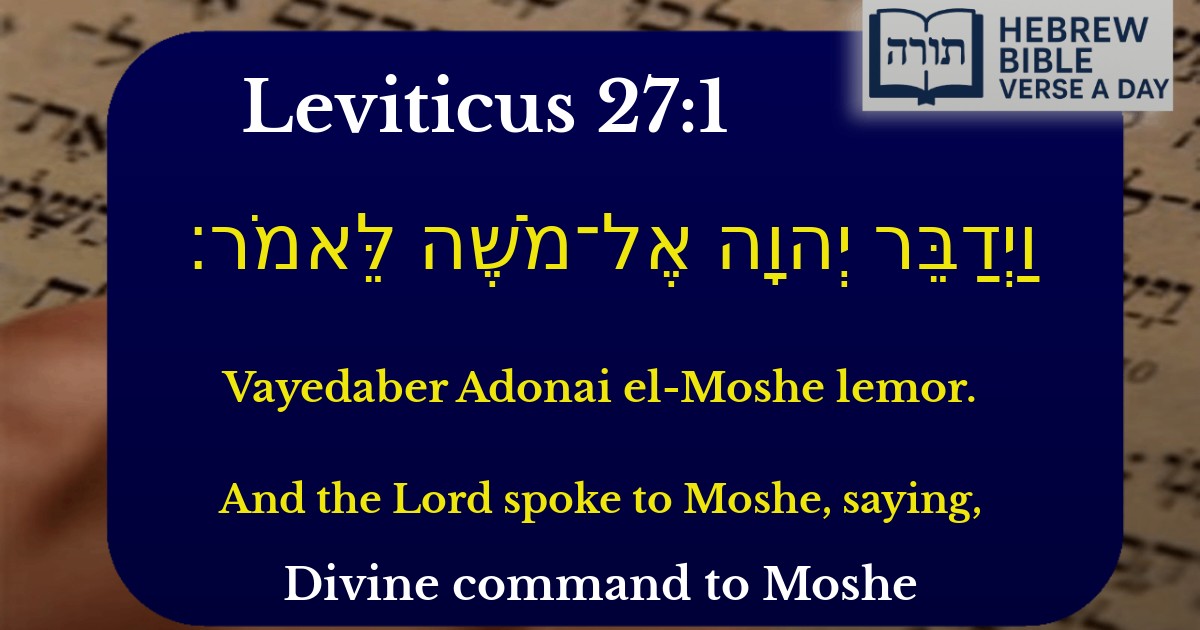Frequently Asked Questions
Q: What does 'And the Lord spoke to Moshe, saying' mean in Leviticus 27:1?
A: This phrase is a common introduction in the Torah indicating that Hashem is giving a new commandment or teaching to Moshe to transmit to the Jewish people. Rashi explains that this wording emphasizes the divine origin of the laws that follow, showing they come directly from G-d to Moshe.
Q: Why does the Torah repeat 'saying' after 'spoke' in Leviticus 27:1?
A: The Talmud (Yoma 4b) teaches that the double language of 'spoke...saying' indicates that Moshe was commanded to both teach these laws to the people and to ensure they would be transmitted faithfully to future generations. This emphasizes the importance of Torah education and continuity.
Q: What is significant about how G-d speaks to Moshe in this verse?
A: The Rambam explains in Moreh Nevuchim that when the Torah says 'And the Lord spoke to Moshe,' it refers to a clear, direct prophetic communication. This distinguishes Moshe's prophecy from that of other prophets, as Moshe received Torah directly from G-d with perfect clarity.
Q: Why does this verse appear at the beginning of Leviticus 27?
A: This introduction begins the section about vows and donations to the Temple. The Midrash (Torat Kohanim) explains that placing this here teaches that just as the previous section concluded with laws of shemita (the Sabbatical year), this section about voluntary offerings shows our ongoing commitment to G-d even beyond obligatory commandments.
Q: How does this verse connect to Jewish practice today?
A: While we no longer have the Temple, the principle of G-d speaking to Moshe reminds us that all Torah commandments - whether about the Temple service or other matters - originate from divine revelation. The Talmud (Berachot 5a) derives from such verses that we must approach Torah study with the same reverence as if receiving it directly at Sinai.


The Divine Communication to Moshe
The verse "וַיְדַבֵּר יְהוָה אֶל־מֹשֶׁה לֵּאמֹר" ("And the Lord spoke to Moshe, saying") appears frequently in the Torah, introducing direct communication from Hashem to Moshe Rabbeinu. Rashi (on Shemos 6:2) explains that this phrasing emphasizes the clarity and directness of Hashem's words to Moshe, distinguishing it from other forms of prophecy which might come through visions or dreams (see Bamidbar 12:6-8).
The Significance of "לֵּאמֹר"
The term "לֵּאמֹר" ("saying") is interpreted by the Midrash (Shemos Rabbah 28:6) as indicating that Moshe was to relay the divine message exactly as received, without adding or omitting anything. The Rambam (Yesodei HaTorah 7:6) elaborates that this underscores Moshe's unique role as the most precise of all prophets, transmitting Torah with perfect fidelity.
Contextual Importance
Linguistic Nuance
The Malbim (HaTorah VeHaMitzvah, Shemos 6:2) highlights the difference between "וַיְדַבֵּר" ("spoke") and terms like "וַיֹּאמֶר" ("said"). "Dibbur" implies a forceful, deliberate transmission, fitting for commandments that require strict adherence, while "amirah" can denote softer speech. Here, the Torah uses "dibbur" to signify the authoritative nature of the revelation.